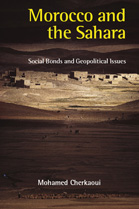
|
Morocco and the Sahara: Social Bonds and Geopolitical Issues
Mohamed Cherkaoui
2nd revised and extended edition
November 2007, £10.00, €15.00, $20.00; hardback, 216 pp.
ISBN-13: 978-1-905622-13-9
NO LONGER AVAILABLE
This careful and well-informed study by a leading sociologist explores key questions about Morocco and its relations with the Western Sahara. The strategies of the main actors are discussed, and the underlying game theories that explain their actions are analysed in regional and international contexts. The geopolitical dimension of the present situation is explored, in terms of the ever-present threat of a balkanization of this part of North Africa. Proposals for autonomy for the Saharan regions are examined in the light of the vast and unprecedented programme of reform undertaken by Morocco in the last decade, opening up new political solutions.
A central feature of the book is a ground-breaking sociological study of the social, economic and political integration of the Saharan population within Moroccan society. Mohamed Cherkaoui undertakes a detailed and rigorous analysis of the available social and economic data on this subject going back over 40 years. He shows that integration is often accompanied by social movements best explained through a theory inspired by de Tocqueville. In addition, his study of more than 30,000 marriages among the peoples of the Sahara is used to argue that matrimonial exchange is one of the best indicators of close social bonds between Morocco and the Western Sahara. His analysis of changes in marriage patterns since the mid-1960s is both surprising and telling. And, as he concludes, walls can be built and artificial boundaries drawn, but the desire of people to live together can never be broken.
Contents:
Preface
Introduction: To Erase History is to Mortgage the Future
PART ONE: Stratocracy or Democracy?
CHAPTER 1: Balance of Power in the Maghreb: Impact on the Geostrategic Future of the Greater Middle East
CHAPTER 2: The State in Crisis: On Tribal Temptation and the De-territorialization of Terrorism
CHAPTER 3: Morocco and its “Silent Revolution”
PART TWO: Social and Economic Integration of the Western Sahara
CHAPTER 4: Integration and its Measurement
CHAPTER 5: Declining Illiteracy
CHAPTER 6: Substantial and Rapid Increase in School Enrolment in the Sahara
CHAPTER 7: Human and Social Development
CHAPTER 8: Marriage in the Sahara
CHAPTER 9: Modernization Processes and Social Movements
Conclusion
Appendix of Maps
Bibliography
Index |



